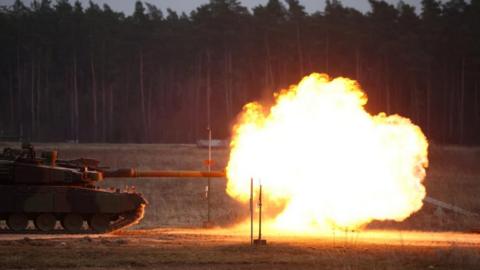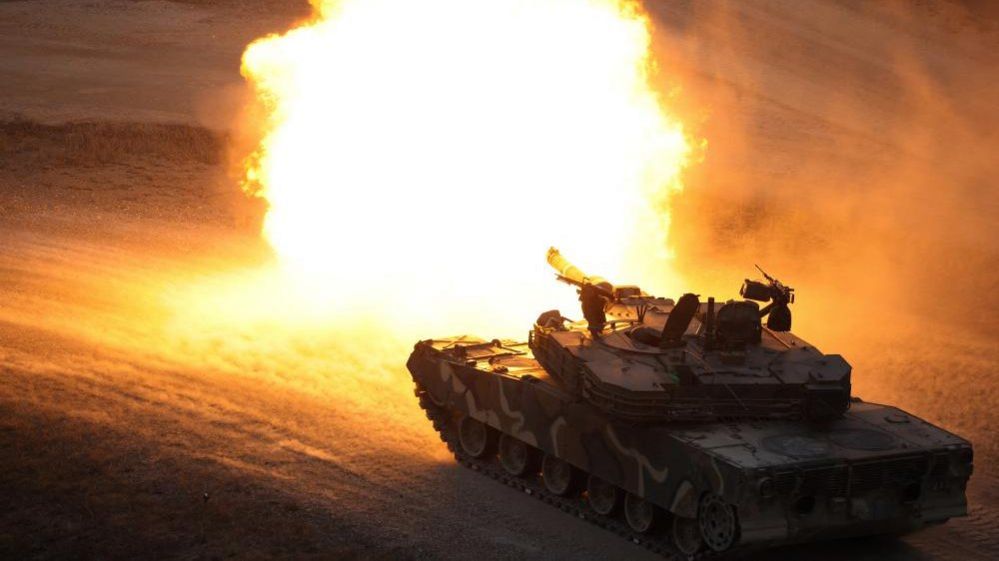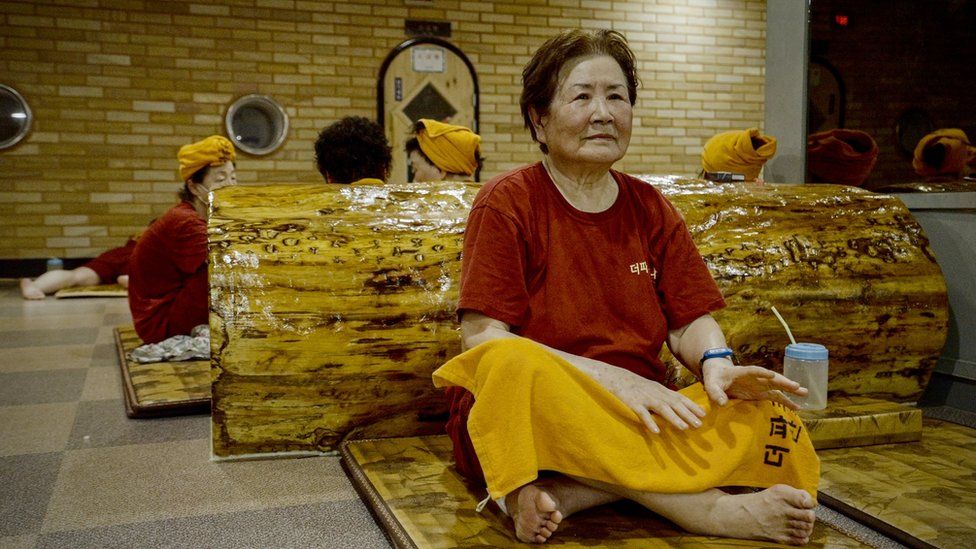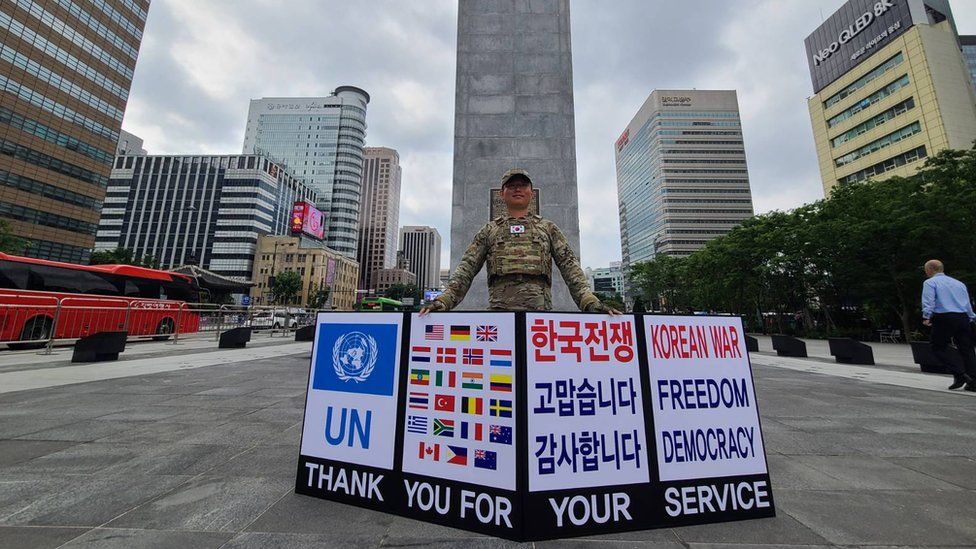
Sgt Kim Jae-kyung stands, unflinching, outside the Colombian embassy in Seoul, dressed in full military gear. The day before, he was in front of the Dutch embassy. The day before that, it was the Greek.
This one-man demonstration by the former special forces soldier is his way of showing gratitude to all 22 countries who sent troops or medics to support South Korea after it was invaded by its neighbour North Korea in 1950. Now he wants his country to help Ukraine, following its invasion by Russia in February 2022.
“We are lucky enough to now be the 10th most prosperous country in the world, because of the foreign soldiers who shed their blood and sweat for our country,” the 33-year-old says.
It is this rationale which led him to the battlefield in Ukraine, where he served on the front line for four months alongside the Ukrainian army, as an anti-drone gunner and combat medic for the 3rd Battalion of the International Legion.
Kim is one of just a handful of Koreans known to have defied his government’s orders, by heading to Ukraine to fight. As he entered the north-eastern city of Kharkiv, shortly after it was reclaimed from the Russians, he witnessed first-hand what he describes as “horrendous, evil, war crimes”.
This is why – in his mind – South Korea must now do more to help the Ukrainian war effort.
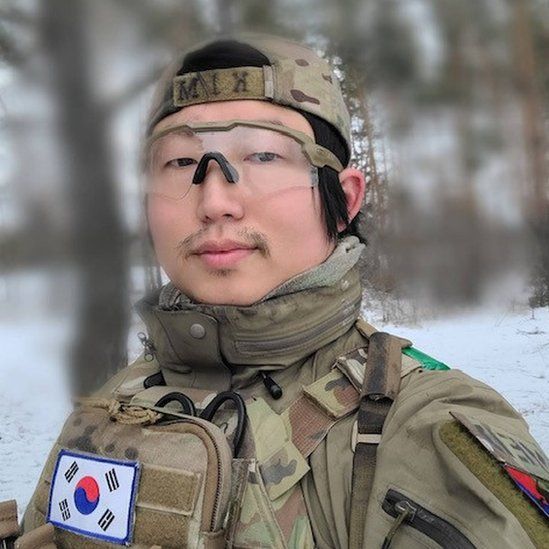

Weeks into its counter-offensive, Ukraine is burning through ammunition faster than its allies can produce it.
Meanwhile South Korea is cautiously sitting on one of the biggest stockpiles in the world. With its own conflict with the North still unresolved, it doesn’t know when it might need the bullets.
Not only this, but with its flourishing defence industry, it is turning out tanks and other weapons at a speed that countries in Europe can only dream of.
Ever since the start of the Ukraine war, pressure has been building on Seoul to send its arms to Kyiv, from the US, UK and EU member states. They have invited the South Korean President Yoon Suk Yeol to next week’s Nato summit in Vilnius.
Ukraine’s Ambassador to South Korea, Dmytro Ponomarenko, told me ahead of the summit that he believed South Korea’s weapons could “change the course of the war”.
Ukraine’s President Volodymyr Zelensky recently made a similar plea in the Korean press.
“Please remember that 70 years ago, Korea was in desperate need of help. The whole world reached out to Korea in defence of justice and freedom. Ukraine today is like Korea 70 years ago,” the leader said.
But, despite signing up to all international sanctions on Russia, and providing Ukraine with more than $200m of humanitarian aid, the government has drawn the line at sending lethal weapons.
Publicly politicians have been able to hide behind a long-standing policy of not arming countries in conflict, but privately many worry about antagonising Russia. Before the war, in 2021, the two countries conducted $27bn worth of annual trade. Seoul also hopes, somewhat wishfully, that Russia might be able to keep North Korea in check.
“The Russians have made it very clear to us that weapons are their red line, and that if we cross it, they will retaliate,” a South Korean diplomat told me recently.
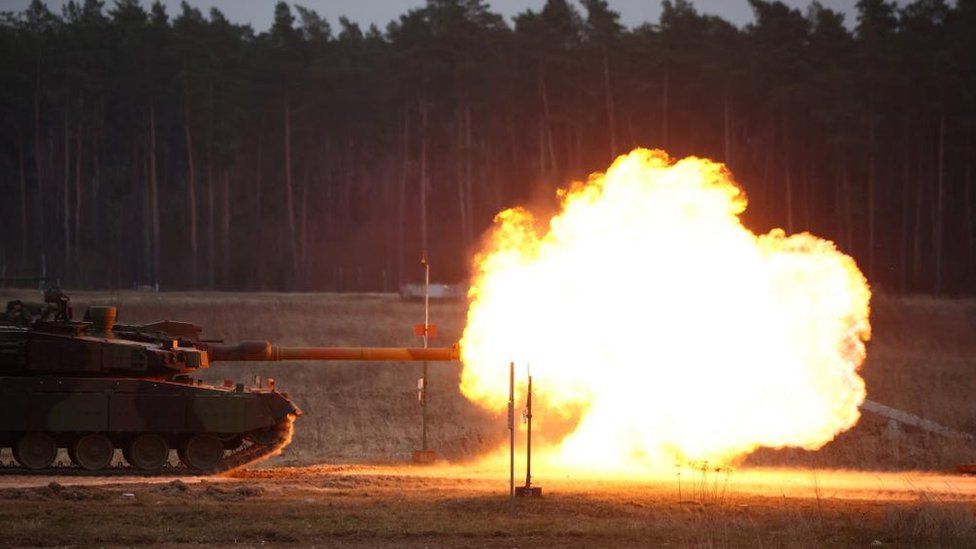
This retaliation may come in the form of economic sanctions, or, more concerningly for Seoul, support for North Korea’s leader, Kim Jong Un. The Russian politician and former president Dmitry Medvedev hinted in April that Moscow could supply Pyongyang with the latest technology for its nuclear weapons if Seoul were to support Ukraine militarily.
Instead, South Korea has taken the more comfortable approach of selling weapons to those who are already arming Ukraine, to help replenish their depleted stocks. Last year it sold $13.7bn worth of tanks, jets and other arms to Poland, followed this year by a huge haul of ammunition – more than 4 million rounds.
And after agonising over whether to provide the US with hundreds of thousands of Nato-standard 155mm shells, a private sale of the artillery has now been agreed. There is little to stop Poland and the US sending these weapons on to Ukraine. Indeed, there are reports (in Korean) that some of the ammunition is in the process of being transferred.
Ramon Pacheco Pardo, the Korea Chair at the Brussels School of Governance, believes Seoul is aware its shells are being redirected.
“It is difficult for the South Korean government to argue that the country’s lethal weapons are being used in Ukraine without its knowledge,” he said. Though the South Korean government is refusing to be drawn on the deals, citing “national security concerns”, and says its policy on weapons supply has not changed.
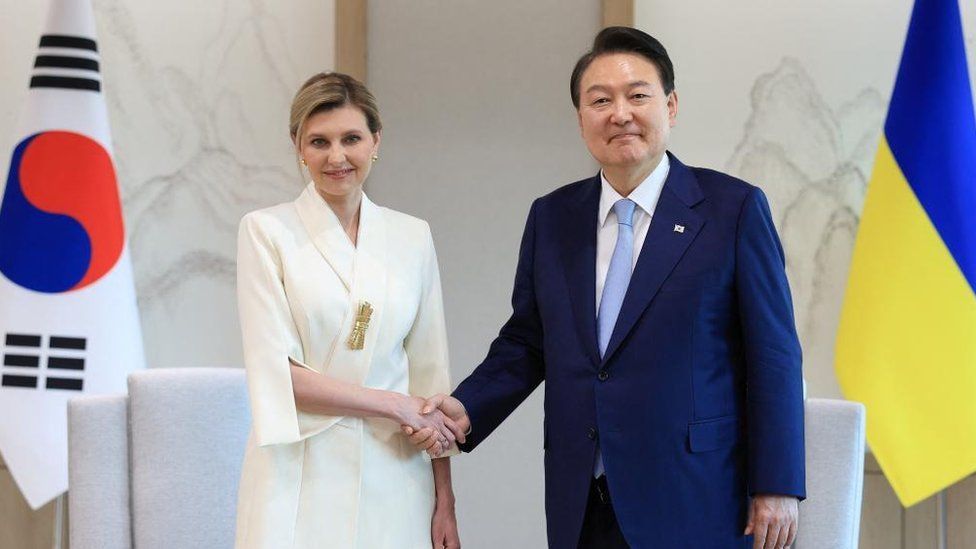
But when Ukraine’s First Lady Olena Zelenska visited Seoul in May, followed by EU chiefs Ursula von der Leyen and Charles Michel, lethal weapons were mysteriously absent from their list of requests. The feeling among Western diplomats in Seoul is this indirect supply is working well enough, for now.
But Ambassador Ponomarenko is urging the government to do more by sending weapons to Ukraine directly. “We understand this is not easy, so as a first step we are asking South Korea to supply us with defensive rather than offensive weapons, like anti-missile and anti-drone systems,” he said.
Some question the difference South Korean weapons would make to the war.
“South Korea’s strength is in the post-war recovery phase rather than military support,” said Prof Kim Youngjun from Korea National Defence University, who advises the government. “Korea’s experience and expertise in building roads, hospitals, schools, telecommunications, will be more useful,” he said.
Ambassador Ponomarenko disagrees. “We know that South Korea would like to participate in the reconstruction of Ukraine, but to start the renovation, we must end the war. And to end the war, we need its lethal weapons,” he said.
Kwon Ki-chang, who served as South Korea’s ambassador in Ukraine until 2021, thinks his country should agree to Kyiv’s request.
He believes South Korea is facing a critical choice, about what it wants to stand for – whether it continues to define its national interest based on economic interests, or whether it wants to champion democracy and freedom.
“We must escape our small country mentality and not be afraid to stand up to Russia, to defend democracy and freedom. We may suffer some short-term economic losses, but we can overcome them. This is the right thing to do.”
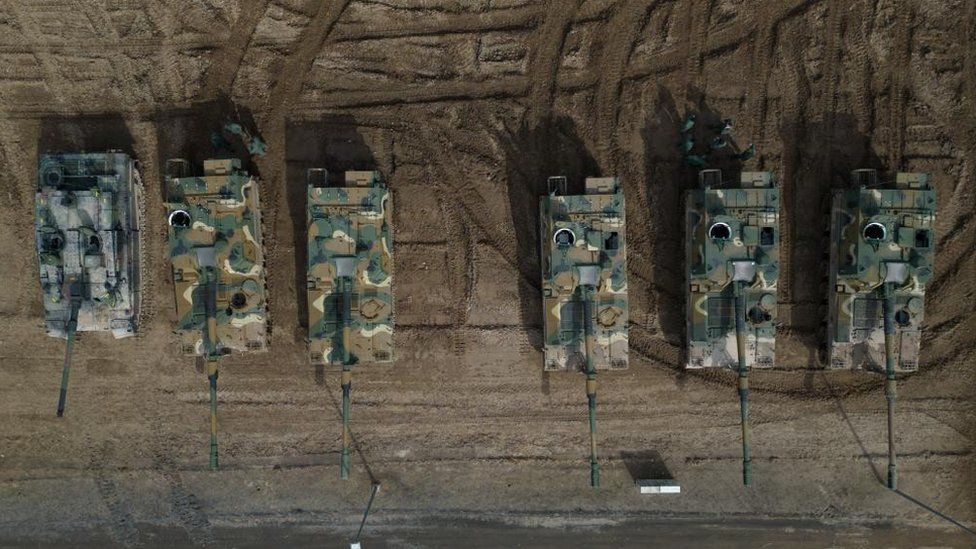
With Moscow surely aware of Seoul’s strategy of indirect supply, one South Korean official suggested it to me, it was not the Russians the government is worried about any more.
A recent poll suggested that 56% of South Koreans oppose such assistance, with 42% in support. With elections next year, the government does not want to give the opposition any metaphorical ammunition.
Though events in Ukraine may force its hand.
Softening his stance, the South Korean president suggested in April that if Ukraine were to come under a large-scale civilian attack, he would consider sending arms. It is said he also sees similarities between the Korean and Ukraine wars.
When the war in Ukraine broke out, some South Korean politicians viewed it as a faraway war. Now they argue it has come too close to home. Few doubt that what happens in Ukraine will change the world, with the impact felt here.
What the South Korean president must decide, as he heads to the Nato summit, is does he want to try to influence the outcome or merely deal with the consequences.
The atrocities witnessed by former soldier Kim Jae-kyung have left him struggling with PTSD, he says, and prone to bursts of anger. He is waiting to find out whether he will be fined for breaking the law, to take part in the war, while his passport has been frozen.
“We must do what we can to end this as soon as possible, and prevent further war crimes,” he says.

